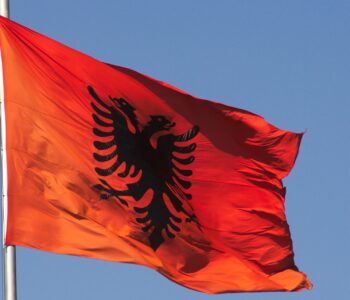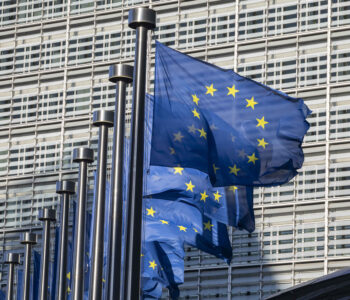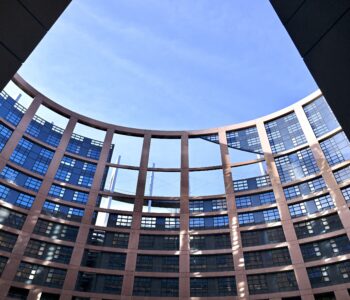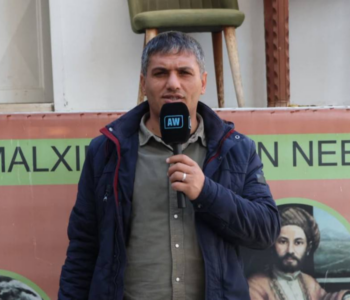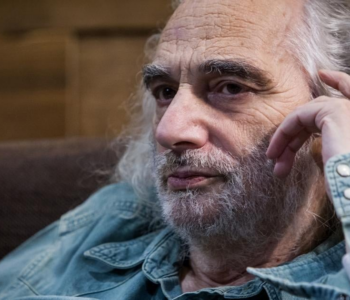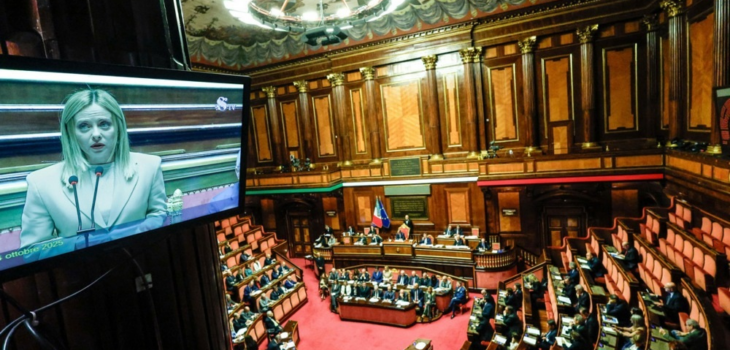
Meloni’s Italy puts media freedom under pressure, regardless of EU rules
This article is part of a series published by IPI and written by expert guest contributors from across Europe on different threats facing media freedom and independent journalism. The views of the author do not necessarily reflect those of IPI.
29.10.2025
Francesca De Benedetti
Whether it is for the unaccounted use of spyware or a bomb exploding in front of an investigative journalist’s house, pressure against media freedom in Italy is growing in a disturbing trajectory.
Although an acceleration is underway, this alarming atmosphere has not come out of the blue. Since Prime Minister Giorgia Meloni’s far-right Brothers of Italy party entered government, over the past three years the deterioration of media freedom has become more and more visible.
Journalists have experienced a range of verbal and legal attacks, while ongoing efforts to erode the independence of and capture of the public broadcaster RAI have raised alarm from several organisations monitoring media pluralism.
This trend is consistent with the one seen in countries such as Hungary and Slovakia: wherever an illiberal playbook has been deployed, the capture of public media is often the first move.
In Meloni’s Italy, an unprecedented shift has taken place in recent months, drawing increasing concern at the European Union and beyond.
Hostile environment
On 16 October, a car bomb exploded outside the home of one of Italy’s top investigative journalists, Sigfrido Ranucci, host of in-depth reporting tv programme Report. The bomb went off 20 minutes after Ranucci’s daughter parked the car. No one was injured, but after long-time receiving intimidations, “this was a qualitative leap”, as Ranucci himself put it.
Although the authorities are investigating the incident and the entire political community in Italy has expressed its solidarity, the explosive attack comes amid ongoing verbal and legal attacks against Report and Ranucci himself by the governing majority.
Rai journalist Vittorio Di Trapani, President of the Italian National Press Federation (FNSI), told IPI that Ignazio La Russa, the co-founder of Brothers of Italy serving as Italy’s President of the Senate, had referred to Report as “serial slanderer” and governing party, Fratelli d’Italia, had sued Ranucci along with his colleague Giorgio Mottola.
Di Trapani added that “the political solidarity that has been expressed towards Ranucci was hypocritical, given all the attacks that have been launched against Report’s investigative journalism.” He indeed: “Four out of 28 episodes of the program were even removed from this year’s TV schedule”.
In 2023, Ranucci had even been summoned by the Parliamentary Committee for the general direction and supervision of radio and TV broadcasting, a move that the partner organisations of the Media Freedom Rapid Response (MFRR) had condemned as “another intimidation practice targeting an independent investigative TV programme whose reporting has been critical of a number of members of the current government”.
In the following year, after Report’s investigation concerning Albania, both the Italian and Albanian Prime Ministers jointly attacked the public broadcaster’s journalists verbally. Meloni’s playbook of verbal attacks on independent media and attempts to delegitimize investigative journalism includes accusations of acting against the national interest or even serving specific political interests.
This increase in attacks is reflected in the 2025 Media Pluralism Monitor (MPM) report, published before the car bomb attacks, which stated that “there has been an increase in threats and intimidation against journalists, as well as several cases that reveal serious shortcomings in the protection of journalistic sources and of journalists themselves”.
Spyware attacks
In addition to physical attacks and continuous political pressure on RAI, Italy is also the EU member state which has seen the most recent cases of spyware attacks on journalists in the last year.
“Nine months have passed since Meta informed me that my mobile had been targeted with spyware made by Israel-based Paragon Solutions”, Francesco Cancellato, editor-in-chief of Fanpage, an Italian news outlet known for its investigative report The Meloni Youth, told IPI.
Over the past few months it has emerged that additional journalists, such as his colleague at Fanpage, Ciro Pellegrino, as well as stakeholders and representatives of civil society, have been spied on using surveillance tools.
Cancellato continued: “Paragon said that it can only provide answers if the Italian authorities ask it to do so. But Meloni’s government is burying its head in the sand. It has decided not to address any questions or concerns about what’s happened.
“Being asked about it in Parliament, the Prime Minister even dismissed the spyware affair as an unimportant, ‘election campaign issue’. I wasn’t even heard in an audition, neither at the Italian parliamentary committee on intelligence agencies nor at the LIBE Committee in the EU Parliament. My colleague Ciro wasn’t invited to speak either. Instead of being recognised by the institutions as journalists that are victims of spyware, we go through political isolation as if we were enemies”.
Until now, no one has been held accountable and the identity of those behind these illegal surveillance attacks remains unclear – mirroring a pattern of impunity for such spyware attacks elsewhere in Europe.
This case episode also evokes trends already seen elsewhere in Europe. In 2021, in Orbán’s Hungary, investigative journalists were on the list of those spied on with Pegasus; but the government dodged the issue without providing any accountability.
Illiberal trend vs EU law
In the face of growing threats against free and independent journalism across the bloc, the European Union has recently provided Europeans with new tools to protect media freedom.
The anti-SLAPP directive has been adopted and the European Media Freedom Act (EMFA) has been in full force since 8 August. But Italy is moving in the opposite direction.
In 2024, after monitoring 41 countries, the Coalition against SLAPPs in Europe (CASE) reported that Italy is the country it monitors with the highest number of Strategic Lawsuits Against Public Participation.
In recent years in Italy “we have witnessed an increasingly alarming resort to this form of legal harassment by high and very high-level public officials”, said Sielke Kelner, coordinator of CASE Italia and the advocacy officer at OBCT, adding it represented “a worrying sign of growing intolerance on the part of the ruling coalition towards any form of criticism.”
The Italian legislation still lacks a dedicated anti-SLAPP framework. A few weeks ago, the European delegation law 2025 – which allows transposition of EU directives into domestic law – was presented in the Italian Parliament. However, the EU Directive 1069/2024, also known as “Daphne’s law”, was not included.
Meanwhile, EMFA is now in force and member states should act. In May 2024 the MFRR organised an urgent mission to Italy. The subsequent report, Silencing the Fourth Estate: Italy’s Democratic Drift, confirmed that “since Giorgia Meloni took office as Prime Minister of Italy, the country’s public service broadcaster Rai has been facing an unprecedented level of political interference”.
According to Article 5 of EMFA, Italy must ensure that public service media providers are editorially and functionally independent and provide in an impartial manner a plurality of information and opinions to their audiences.
Despite these obligations, “the Italian authorities have done nothing” to implement the new EU obligations, said Di Trapani of FNSI. Instead, the government’s takeover of the public broadcaster keeps worsening, he added: “RAI has been without a president elected in accordance with the law for over a year now, and the term of office lasts three years.
“This is because the majority and the government want to impose a name but do not have enough votes to do so, and are therefore also blocking the work of the parliamentary committee that oversees RAI. So, essentially, the government is blocking parliament until it gets what it wants, and the Parliament cannot oversee RAI”.
Just when the European Union is becoming mature enough to recognise attacks on media freedom, there is a government in Rome that prefers to turn a blind eye.
Francesca De Benedetti is Senior Editor at the Italian daily Domani, where she covers European politics, as well as a fellow at IWM. De Benedetti writes columns for Vanity Fair and Jacobin (USA); her writing on Italian politics has been published by The Independent, Balkan Insight, Die Presse and other international outlets. De Benedetti previously worked as a reporter at la Repubblica and La7tv.
This guest article by IPI was commissioned part of the Media Freedom Rapid Response (MFRR), a Europe-wide mechanism which tracks, monitors and responds to violations of press and media freedom in EU Member States and Candidate Countries.


